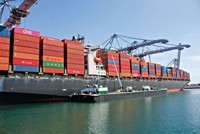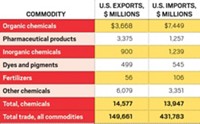Advertisement
Grab your lab coat. Let's get started
Welcome!
Welcome!
Create an account below to get 6 C&EN articles per month, receive newsletters and more - all free.
It seems this is your first time logging in online. Please enter the following information to continue.
As an ACS member you automatically get access to this site. All we need is few more details to create your reading experience.
Not you? Sign in with a different account.
Not you? Sign in with a different account.
ERROR 1
ERROR 1
ERROR 2
ERROR 2
ERROR 2
ERROR 2
ERROR 2
Password and Confirm password must match.
If you have an ACS member number, please enter it here so we can link this account to your membership. (optional)
ERROR 2
ACS values your privacy. By submitting your information, you are gaining access to C&EN and subscribing to our weekly newsletter. We use the information you provide to make your reading experience better, and we will never sell your data to third party members.
Trade
Chemical makers call for talks to resolve trade tiff with China
Tariffs threaten growth of U.S. chemical industry, Congress told
by Glenn Hess
April 17, 2018

Long-standing trade friction between the U.S. and China should be addressed through constructive negotiation rather than through tariffs, a top chemical industry official told a congressional panel on April 12.
Chemical makers share the Trump administration’s concerns about China’s inadequate protections of intellectual property and forced technology transfer practices, American Chemistry Council (ACC) CEO Calvin M. Dooley said in testimony before the House of Representatives Committee on Ways & Means.
But if the world’s two largest economies continue to slap tariffs on each other in an escalating trade war, U.S. chemical manufacturers, energy producers, and farmers would be among the biggest losers, Dooley added.
Those industries “are generating increasing trade surpluses, and we cannot allow them to become causalities of trade disputes,” Dooley told the committee. “We urge the U.S. and Chinese governments to put aside talk of a trade war and stop the volley of potential tariffs.”
On April 3, the White House proposed 25% tariffs on more than 1,300 imported Chinese products with a total value of roughly $50 billion. China retaliated with a list of proposed duties on $50 billion of American imports. President Donald J. Trump then upped the ante, directing U.S. trade officials to identify $100 billion in additional tariffs against China.
ACC, the chemical industry’s main lobbying group, estimates that $5 billion in U.S. chemicals and plastics trade to China would be affected under the tariffs that China has proposed.
As a first step to lower the tension, Dooley said the U.S. should immediately revoke the steel and aluminum tariffs it separately announced on March 7 on imports from China and other nations.
Dooley suggested that the Trump administration should then outline a clear, detailed plan for how it will address persistent problems in China, including making greater use of the World Trade Organization’s dispute settlement mechanism and negotiation pillars.
“We are hopeful that, with support from Congress, the administration and the Chinese government will recognize that it is in the best interest of both countries to commit to a process that will produce a mutually beneficial agreement before the proposed tariffs go into effect,” Dooley testified.
Rep. Kevin Brady (R-Tex.), committee chair, said China’s “misbehavior” requires global solutions. “We should work as closely as possible with our allies, and we should never create disincentives for our allies to join us in taking strong action. The world, not just the U.S., must stand up to China’s unfair trade practices,” Brady said.





Join the conversation
Contact the reporter
Submit a Letter to the Editor for publication
Engage with us on Twitter